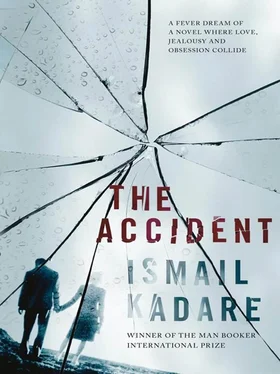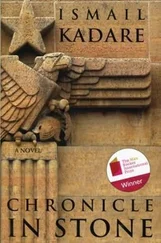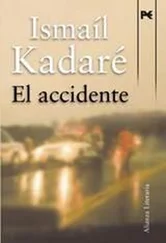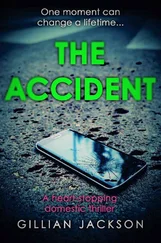She waited for him to calm down and took his hand in hers, asking gently, “How do you know what he saw in his dream?”
After he had wiped away his tears, his eyes looked larger, defenceless.
“You told me yourself… when you wanted to show me how complicated he…”
She remained silent, biting her lower lip, while to herself she said, oh God.
Several years later Janek B.’s notes enabled Rovena’s friend in Switzerland to recall in a new light the short phone conversation she had had with her during her northward journey. A detail that had seemed a slip of the tongue had unlocked the whole mystery of The Hague.
“Hallo, darling. Is that you? So pleased you called. Where are you calling from?”
“Can you imagine? From Denmark, from a train.”
“Really?”
“I’m going to see Besfort.”
“Wonderful!”
“I can see windmills, tulip fields.”
“Tulip fields?”
“I mean… some flowers a bit like tulips… I don’t know their names.”
“Never mind. So it means you’re back together again…
Hello? I can’t hear very well. Bye for now, darling.”
“Bye.”
What an idiot I am, Rovena thought, putting down the phone. I can’t even keep a simple promise. “Don’t tell anybody about this trip to The Hague,” Besfort had said. Lightly, she had asked why not, and he had answered just as airily: “No reason, let’s just make it a secret trip. Everybody should make a secret journey at least once in their lives.” And she had cheerfully agreed.
In a second phone call, he explained that in such little subterfuges the best way not to get caught out when people ask you where you’re going is to substitute another destination, for example, Denmark instead of Holland. “Let’s say a trip to Denmark to see the places where the story of Hamlet really happened. While we’re on the subject, do you have a pen? Write down Jutland, that’s the province, and Saxo Grammaticus, who wrote its first history. With an ‘x’ and double ‘m’. That’s enough. No need to get mixed up with all that endless ‘to be or not to be’, OK?”
What an idiot, thought Rovena again. She tried to forget her blunder. She had prepared herself so carefully for this journey that it was silly to worry about something so trivial. She had a surprise ready, besides her new lingerie: two little tattoos, one between her navel and her breasts and the other on her rear. So they would be visible in whatever position they made love. She also had a stock of sweet nothings to whisper, although she couldn’t be sure if she was still entitled to use them or not.
The monotonous sound of the train lulled her to sleep. You’ve exhausted me, she thought, thinking of Besfort waiting for her.
The words of a song, probably one she had never heard but had dreamt up in her imagination, kept coming back to her:
If I could live my life anew
I’d give myself again to you.
A second life, she thought. Easy to say, but so far nobody had ever been given a second life, still less the chance to go on loving someone in this other life. Yet people would never give up the hope of it, and neither would she and Besfort. They had a kind of faint, extremely faint, conception of this forbidden life. In their fear of it, the fear especially of reaching too far and thus bringing down the wrath of heaven, they were pretending they did not love each other at all.
She woke up smiling after her short sleep. As a small girl she had enjoyed this kind of self-deception, arranging facts to suit herself.
Such secrecy, she thought. Janek’s imagination would run riot. Any one of Besfort’s instructions would chill the blood of a woman going to meet her lover… “Not a word to a soul about this trip. Destroy the train tickets and every shred of evidence. I’ll tell you the reason later.”
Words came over the loudspeaker in Dutch, then in English. They were arriving at The Hague. She phoned his mobile a third time, but still there was no reply.
She found a taxi easily, and then the hotel. A Dutch name, with no crown.
There was no message for her at reception, apart from an instruction to show her to Besfort Y.’s room. He himself was not there.
She looked round the spacious room. His two suitcases were there. His razor and his familiar aftershave were in the bathroom. On a small table was a bouquet of flowers and a card of welcome in English from the hotel manager. No message from him.
She sank into an armchair and sat there for a moment, totally drained. Saxo Grammaticus. Jutland… He might have left some sort of sign. I will be there at such and such a time. Or simply, wait for me in the room.
Her gaze wandered involuntarily to the telephone. She stood up to call again, and one of the suitcases suddenly struck her as unfamiliar. The second one too. With a cold stab, the idea struck her that she had been given the wrong room. She rushed into the bathroom to settle her doubts, and all her sense of security evaporated. Didn’t lots of men use that aftershave?
She opened the wardrobe doors. He had the habit of hanging up his shirts as soon as he checked in, but none of them were there. She looked at the two suitcases again, and automatically opened the catch of one. Before she saw any of the contents, a large envelope slipped out and fell on the bed. She was about to put it back when a bundle of photographs slid out of it. With trembling hands she bent down to collect them, and screamed. One photo showed a blood-spattered child. So did the others. What should she do? Was this the room of a serial killer? Should she shout for help, run outside to call the police?
Nobody must know that you are coming to The Hague… She bent down to look at the envelope again. It was addressed to “Besfort Y. Council of Europe. Crisis Department. Strasbourg.”
It was for him.
Oh God. But alongside her horror there was a kind of relief. At least he really was at the Council of Europe. The address on the envelope proved this, and also that someone had sent the photos to him, perhaps as blackmail, or to remind him of something.
The ringing of the phone made her jump. She cleared her throat before lifting the receiver. It was him. She could barely grasp half of what he said. He was sorry but he would be late.
“Something has happened,” she said.
“Really?”
“I can’t talk about it on the phone.”
“I can tell that from your voice. Why don’t you take a short walk? It’s a nice city. I’ll be there at five o’clock.”
She did what he said. Outside, her fears eased and seemed less plausible. Her feet carried her down an attractive street. All her earlier suspicions seemed crazy. Her nerves must be shattered. For the second time she thought she heard someone talking Albanian. She had heard that nervous breakdowns often started like this, with imaginary voices.
Standing in front of a shop window, she heard the voices again. She stood rooted to the spot as the voices moved away. Only then did she turn her head to look. A small group of men were moving away, talking noisily. She had never imagined that there could be so many Albanians in The Hague. Perhaps this was why Besfort so insisted on secrecy.
She entered the first café she saw. From behind the window, the street looked even prettier. She was no longer surprised at hearing Albanians talking, in loud voices as usual. They were smoking. She heard the words “today’s session”, the insult “arsehole” and then the name of Milošević. Everything was clear. The great courtroom building must be nearby.
She sipped her coffee without turning her head. Suddenly she recognised a familiar face. The man was sitting alone at his table, listening to the foreigners’ noisy conversation with unconcealed curiosity. Surely she had seen this man before. Then she remembered. He was a distinguished writer. At any other time it would have been natural to strike up a conversation with him. She was studying in Austria, which was the writer’s own country, but she remembered his pro-Serbian views and the desire to speak to him melted away.
Читать дальше












